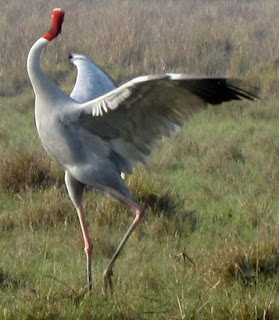We travelled by car from Kushinigar to Lumbini, Nepal. The
drive took about three hours, and we were able to see the countryside as we
rode. There is a lot of sugar cane that’s grown near Kushinagar. We saw mostly
women working in the fields (about 75% female). And there were trucks pulling
carts loaded of canes that we passed as we drove.
Here is Pete in front of sugar cane plants.
The fruits and vegetables we’re eating on the trip have been
good quality. This picture shows a typical “produce market”. We think the woman
vendor is probably also the farmer.
We’re staying at the Korean monastery in Lumbini, which is
rustic but it’s quiet and very clean. We got their last open room, as a large
group from Sri Lanka is here, too. We will pay about $18/day for the room and
all our meals, so it’s amazingly cheap. The temple here is enormous and by day
looks like a monolithic concrete building, but in the evening they light the
interior with candles and it looks beautiful.
Lumbini is the birthplace of the Buddha. He was born into a
powerful royal family through an exceptional birth: it is said prince
Siddhartha took 7 steps immediately after he was born from his mother’s side.
It was prophesized that he would either become a powerful king or an inspiring
spiritual leader. His father, King Suddhodhana, wanted to ensure he would be a
king, so he pampered his son with worldly possessions including 3 different
palaces (one for each season). But this wasn’t enough to satisfy Siddhartha and
at 29 he left the palace, his wife and infant son to seek the spiritual path.
The way the Buddha is typically represented in Lumbini is as a baby Buddha.
This Thai temple had at least 115 baby Buddhas inside.
We’ve noticed the “Buddha brand” through out our pilgrimage.
It makes sense to have Buddha Hotel, Buddha Restaurant and Buddha Travel and
Tours, since these business are catering to tourist/pilgrims’ needs like ours.
In Lumbini we’re seeing a twist with shops like Baby Buddha Handicrafts. We
asked ourselves, what would the Buddha think if he saw this shop? Perhaps he’d
think that mobile phones were magic, or perhaps just another thing to get
attached to!
It’s amazing how many temples there are in Lumbini. While
it’s been typical for Buddhist countries to each have a temple in some of the
other pilgrimage places, here there are seven Nepali temples and even groups
from France, Germany and Austria have built temples. Here’s a photo of the
elaborate German temple of the Tara Foundation, which has a lot of Tibetan and
Nepali influences.
The Chinese temple and monastery complex was also impressive
and beautiful. A number of details used a dragon theme.
The fog was dense this morning as we went to the World Peace
Temple. (This is the third Peace Temple we’ve seen on the pilgrimage, with
others in Rajgir and Sarnath.)
Lumbini has areas that feel like lush gardens with lovely
landscaping like here at one of the seven Nepalese temples we visited.
They have limited where cars can travel in the town, and
they are also trying to eliminate plastics (but this will take more than the
fines that they have implemented to accomplish this goal). We rented bikes for
a day and enjoyed pedaling on the pedestrian / bike paths.
Lumbini has several wetlands, and we saw birds and waterfowl
that were common for us: ducks, cormorants and egrets. We visited the Crane
Sanctuary and were delighted to see Sarus Cranes, which are the largest cranes that
can reach up to six feet tall with an eight foot wingspan. They are not afraid
of people, so we could get pretty close. We watched them for a long time and
were rewarded by getting to see them dance and jump – we read that this is how
they let off steam, and they seemed very joyful as they frolicked in the
wetlands! They have incredibly loud calls, enough to wake us up early one
morning even though we were wearing earplugs.
We also saw other birds that were new to use: a majestic black stork, and beautiful blue
and red Kingfishers. (Sorry about the quality of the photo, but he's a small bird that was far away.)
Thanks for reading about our adventures! Next we head back
to Bodhgaya, which will take several days because we need to cross from Nepal
back to India then take two trains. We hope to post to our blog once more
before our meditation retreat starts on February 10th.















